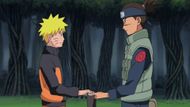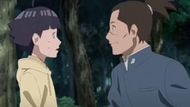Boruto continues Naruto’s story with new ninjas and some old ones. Iruka, Naruto’s first mentor, doesn’t appear frequently. He’s not leading missions or fighting anymore. However, that doesn’t mean he’s no longer important. Iruka is still relevant in the story.
In this new era, Iruka has taken on a quieter role. He was appointed headmaster of the Ninja Academy, where he molds young minds. While Boruto focuses on newer characters, Iruka continues to work behind the scenes and makes sure the children have a proper introduction to life as shinobi.
During the entrance of new students like Mitsuki, Iruka also assisted teachers such as Shino, who was struggling to manage his class. In the School Trip Arc, Naruto shared his idea for a symbolic trip to Kirigakure to build peace between villages. Iruka supported the idea, showing he still believes in progress. Later, when Boruto and his friends helped stop a coup at Kirigakure, Iruka disciplined them for acting without permission. But he clearly respected their actions.

The graduation exams brought Iruka back into the story again. He asked Kakashi to watch the exams and go easy on the kids. Kakashi said no because he thought they needed a real test. Iruka didn’t agree with the harsh approach, but he accepted that Kakashi helped the students grow. This showed that Iruka still cares deeply about their development.
Even after Naruto became Hokage, Iruka still supported him. At the ceremony, he immediately sensed something was off and realized the person speaking wasn’t Naruto. It turned out to be Konohamaru in disguise. That moment showed that Iruka still knows Naruto better than most. Even after all that they have been through.

Family moments also highlight Iruka’s role in Boruto. When Sakura went on a mission, she trusted Iruka to look after Sarada. Later, on a trial session for the Academy for young children, Iruka observed Himawari's low confidence. He reassured her, telling her that it’s fine if she takes some time to figure out what she wants to do. Thanks to his support, Himawari completed the mission with new confidence.
Different Arcs in Boruto
There were also moments when Iruka stepped up during times of danger. During an Academy festival, a terrorist threat trapped everyone inside. Iruka helped organize the response and allowed former students to help disarm the threat. Even though he didn’t fight, his calm leadership helped protect everyone involved.
His role in the Kawaki and Himawari Academy Arc also proved his continued importance. Iruka was the only other staff member who was aware of Kawaki’s assignment to protect Princess Kae. He didn’t intervene, but he quietly encouraged the effort and served as a look-out. That silent faith in the capacity of his students is a sign of his many years lived and a deep belief in how people can change.

There are also emotional touches that show how much Iruka still matters. He attends memorials for fallen heroes and attends school events. Although he no longer teaches in the classroom, he still has an impact on students and their futures. His influence lives on, albeit not as widely acknowledged. In the recent manga chapters of Boruto, he has not had any appearances.
Conclusion
Iruka is by no means a major character in Boruto, but he’s also not just around, doing whatever. His existence has meaning. He symbolizes where it all began: a sensei who helped raise the future Hokage. His encouragement, guidance, and counsel live on in the generation that will follow him. And in a universe of cinematic jutsu and battles of the flashy variety, that sort of strength is arguably as crucial.
